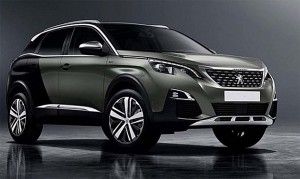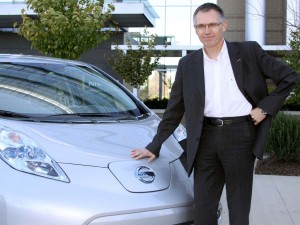After a 26-year absence from the North American market, French automaker PSA Group is formalizing plans to reenter the market, though in a series of interviews and appearances in Detroit this week, CEO Carlos Tavares made it clear he’s not in a rush.
With the once nearly bankrupt automaker now flying high in most of its other markets, Tavares outlined a three-stage process that will take as much as a decade to complete. In the meantime, he is focusing on several other critical endeavors, including the revival of the Opel/Vauxhall operations PSA purchased from General Motors last year, as well as a plan that call for the company to have 100% of its products electrified by 2025.
“When we go into a country we try to be really cautious,” Tavares said during a Thursday roundtable with a small group of journalists, one of several meetings he held in connection with the annual North American International Auto Show. The plan for North America is “more frugal, more humble” and will require only “a small investment,” he explained.
The first stage in the process of returning to the U.S. – which the company’s Peugeot brand abandoned in 1991 — began last year with the creation of a small team headed by 54-year-old Larry Dominique. Previously a product planner at both Nissan and Chrysler, Dominique is working on several initial projects, including the U.S. launch of a global mobility services, Free to Move, as well as a car-sharing service, Travel Car, which he described Thursday as “a sort of AIRBNB for cars.”
Initially launched at LAX, the big Los Angeles airport, it allows motorists to park at a discounted rate and then have their cars rented out on a short-term basis to other travelers, receiving a short of the revenues. The service has expanded to San Francisco and Chicago and will soon enter Seattle.
Such mobility services are “at the heart of our strategic plan” worldwide, said Tavares, and reflect the growing focus on alternatives to the traditional car buying model that many analysts expect to radically change over the coming decade. A new study by the Boston Consulting Group, for example, forecasts 20% of the miles Americans clock on the road by 2030 will be in driverless vehicles operated by ride-sharing services.
But the U.S. version of Travel Car isn’t intended to simply set up a mobility service for PSA. The initial goal is to begin gathering data on what customers like – and dislike – about the cars they rent. That will be used to help the French maker plan future models of its own that it would then bring to the U.S., initially for rental through Travel Car.
“We want not to be arrogant” in assuming PSA knows what sort of features American motorists want, said Tavares.
His company is already taking steps to homologate future vehicles to meet U.S. regulations, including safety, emissions and mileage standards. What is yet undecided is which one of the various PSA brands will ultimately return to North America. The company currently operates Peugeot, Citroen and the newer, upscale DS. Then there is the Opel/Vauxhall unit acquired last year from General Motors, which decided to pull out of Europe after nearly two decades of losses.
(For more on the sale of Opel, Click Here.)
When PSA began taking a look at the German-based GM subsidiary, Tavares said he saw “numbers” nearly matching what he faced when he took over the faltering PSA in 2014. The Portugese native said that gave him confidence Opel could be turned around in much the way Peugeot has, the French company now delivering some of the best margins in the automotive business.
Whether his upbeat assessment proves accurate will likely determine the legacy of Tavares, who turns 60 this year. The 10-year plan he has laid out for the U.S. likely will continue to play out past his retirement unless the PSA board encourages him to remain onboard.
Sometime towards the middle of the coming decade, after getting a clearer sense of not only what products Americans want, but how best to market to them, PSA will complete the reentry process with its own distribution network. That could involve big changes from the way vehicles are marketed today, depending upon how U.S. automotive retailing changes. Various state franchise laws have traditionally barred factory-owned stores and direct, online sales, but upstart Tesla has been challenging that model and could open the door to other newcomers to craft their own approaches.
The vehicles that PSA ultimately hopes to offer to American motorists will very likely feature various forms of battery-based drivelines. During a Wednesday night speech, Tavares declared “the PSA Group will be 100 percent electrified” by 2025. That is expected to include a range of technologies, such as conventional hybrids, plug-ins and pure battery-electric vehicles. PSA already offers four BEV models and will launch more in 2019, the CEO said, referring to them as “second-generation” models, offering longer range.
(Live From Detroit! Click Here for complete coverage of the 2018 North American International Auto Show.)
To Tavares, the approach he has laid out for the North American is “low risk,” since it will minimize initial expenditures. “Generally,” he noted, when automakers enter a market, especially a big one like the U.S., they make “huge amounts of investment that saddles the business case significantly.” There’s a big difference between a plan that can work with sales of perhaps 20,000 vehicles, rather than the 200,000 that might be needed to support a local assembly plant, he explained.
That’s not to say there won’t be risk. If anything, Tavares agreed with a classic mantra of rival Toyota, that the biggest risk is no risk at all. But choosing the nature of one’s risk helps ensure the odds are in your favor, the PSA CEO made clear.
(GM “absolutely” could reenter the European market, says CEO Barra. Click Here for more.)




